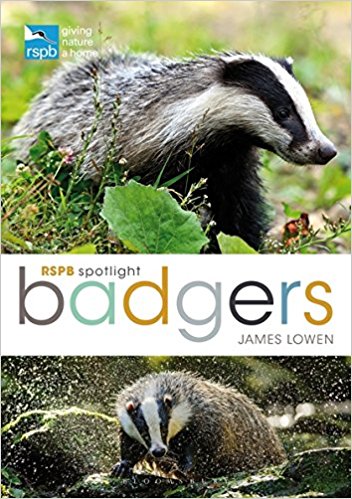Feeding
| RSPB Spotlight on Badgers book |
 |
James
Lowen explores the lives of badgers and their communal
living, feeding habits and threats to their conservation. Click
here to buy:
Paperback edition
Kindle edition
|
Wildlife species - including badgers will come to rely on food
handouts; so you should be careful to plan your feeding regime in
advance. Make sure if you feed large amounts that you can always
do this, so you will need to be sure of reliable holiday
"cover" for when you are away.We often advise giving the badgers an occasional helping hand
(in the winter and spring) with food, like wet cat-food or wet
dog-food, soft-boiled potatoes, very wet pasta, plain nuts (no
salt and no chocolate), moist soft-boiled rice, windfall fruit and soft mushrooms -
especially if the badgers are starting to look a little thin or if
there has been a lot of recent disturbance to their local
territory over the past year or so.
An
occasional burger is normally OK too, although a lot of people do not
like leaving meat in their garden, because of the risk of rats,
foxes, food poisoning of the animals if the meat is left uneaten
and goes off.
Vegetarian burgers are OK for badgers too (they are not generally
fussy eaters).
If you want to give the badgers dog-food or cat-food, start with a value brand and see how the badgers like it. If
you have young badger cubs who visit, small pieces of plain food
are OK - for example - plain moist soft-boiled rice, wet kitten food
or puppy food.
Whilst dry cat food and dry dog biscuits provide nourishment,
they may not provide enough moisture; and so are best avoided in
dry spells. If you put these out, always leave lots of water too.
If you feed badgers, they will mostly be happy to eat lumps of
from the surface of a paving stone, flat rock or the lawn.
In the summer, we'd say just to leave out fresh water. If you
really want to give the badgers a real luxury treat, you could
even buy a tub of earthworms for them. You can get these by mail
order from various suppliers. Obviously, you put them in a
steep-sided metal dish just before the badgers arrive, otherwise
... you can imagine what will happen!
In the autumn, the natural harvest from the countryside may be enough
for them to fatten up for the winter. If not, then put out a bit
of food to help them on their way to gaining a few extra pounds in
weight.
Avoid high-sugar foods, as these will cause tooth decay in
badgers - a problem which can not be cured; and will lead to
loss of teeth for the badger, with a consequent damaging effect
on feeding and a drop down the "pecking order" in the clan.
Literally one handful of sugar-coated cereals once or twice a
month might be OK if you want to encourage the badgers into your
garden, but no more!
Badgers, like too many children, have a very sweet tooth, which
can prove very harmful for them.
Placing dollops of food will make the badgers "sniff it
out", so you might have longer to watch them; and laying a
trail of food may make it easier to see them if they come into an
open clearing or a private garden area. Do be careful not to
encourage badgers to cross busy roads or railways; as the last
thing you'd want to do is to get "your" badgers killed
on the roads.
Risk Factors
The main risk factors to badgers are if you suddenly stop a
major feeding program (due to holidays, illness, etc); and no-one
takes over the duties.
Badgers (and other wildlife) may be at risk if the food you
leave out has very high levels of bacteria (undercooked or simply
gone off) or if it unsuitable for badgers (e.g. too high in
sugar).
Also avoid, leaving out bones (especially chicken bones). These
may cause problems for cubs,
adult with broken or lost teeth; and other species, like cats,
dogs and hedgehogs. Bones will also provide you (and your
neighbours) with a litter problem.
A badger can bite through skin, tendons and muscles, and even
break bones in an adults fingers, hands or wrist. However great
the temptation, NEVER ATTEMPT TO FEED A BADGER DIRECTLY FROM YOUR
HANDS.
Also see our page about Family Pets.
Wildlife Diseases
If you want to attempt to civilise them (by providing a bowl),
then use one of more METAL dog-type bowls, which are difficult to
tip over (e.g. one for water and one for food). Badgers may be
very rough with bowls - for example, biting them, kicking them,
clawing at them and even using them in tug-of-war fights, and
CERAMIC OR GLASS BOWLS WILL GET BROKEN eventually.
To avoid the possibility of cross-contamination, have
"badger-only" bowls; and wash them separately from items
used for people or other pets.
Using rubber-gloves, clean the dishes using very hot water with
a decent quantity of soap/detergent.
Use a badger-only dishcloth and tea-towel; and follow strict
hygiene precautions. This is especially important if any of the
following apply:
- you have any babies or young children
- you have any-one who is or may be pregnant
- you have any-one who is elderly or infirm
- you have any-one who may have a suppressed immune system
Note that this advice does not mean to imply that badgers are
riddled with disease - it's just pragmatic, common-sense advice to
be followed if you come into contact with any wildlife species.
|
